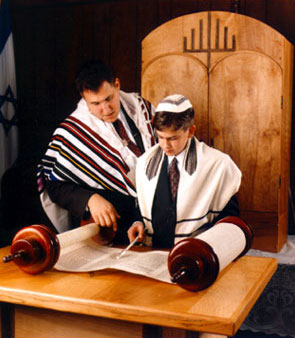Tanakh
- The Hebrew bible, the quintessential sacred text of Judaism. The first five books of this comprise the Torah (or Pentateuch), the core sacred writings of the ancient Jews, traditionally written by Moses under divine inspiration.
- To Jews, there is no "Old Testament." The books that Christians call the New Testament are not part of Jewish scripture. The so-called Old Testament is known to us as Written Torah or the Tanakh. Includes the five books of Moses; Genesis, Exodus, Leviticus, Numbers, and Deuteronomy.
- Much like the Christian bible, there are many prophets introduced and told about in this text but are different. Some of these prophets include; Joshua, Ezekiel, Isaiah, Joel, Judges, and Jonah.
- Also includes writings such as the Proverbs, Chronicles, Job, Song of Songs, Lamentations, Esther, and Daniel.
- In addition to the written scriptures we have an "Oral Torah," a tradition explaining what the above scriptures mean and how to interpret them and apply the Laws. The oral Torah is called the Talmud. Orthodox Jews believe God taught the Oral Torah to Moses, and he taught it to others, down to the present day. This tradition was maintained only in oral form until about the 2d century C.E., when the oral law was compiled and written down in a document called the Mishnah.
- Every Friday night and Saturday morning during celebration of Shabbat, a new portion of the Torah is read. At the beginning of the year, Genesis is read and all five books are read until the end of the year when the last scripture of Deuteronomy is read. The Torah is the most sacred text of the religion and is the leading authority of all Jewish people.
- According to Jewish belief, the Torah was written by God.

Talmud
- The body of civil and ceremonial Jewish law comprising of two separate scriptures, the Mishnah and the Gemara.
- There are two versions of the Talmud; the Babylonian and the earlier Palestinian or Jerusalem Talmud.
- The Talmud was developed in two separate works: Talmud Yerushalmi (the Talmud of the Land of Israel) and Talmud Bavli (the Talmud of Babylonia.)
- The Talmud Yerushalmi was completed c.350CE when the Jewish community in the Land of Israel began to suffer genocidal persecution from the newly empowered Byzantine Christians. The demise of a vibrant Jewish community in the Land of Israel forced many of the Torah scholars living there to flee to Babylonia where Christian dominance did not hold sway.
- The Babylonian Talmud is the main source of definitive Oral law brought from Mount Sinai.
- The Talmud is considered to be the main guide to Jewish life and the Jewish people in all of the lands typically live a Talmudic way of life differing from the ways of their ancestors.
- It is the guiding book for their lives, not just in ritual and law, but in terms of personal behavior, societal goals and vision of the Jewish future.

Excerpts
"...I command you today to love YHVH your God and to walk in His ways and to keep His commandments, His decrees, His civil laws so that you may live and you many increase and YHVH your God will bless you in the land into which you are coming to take as possession." (Deuteronomy 30:16).
The text states that every one reading this excerpt or Jewish person to love "Adonai" our God. God will guide you through his ways, decrees, and laws so that you live a happy life and increase your love for God. One of the goals and main beliefs is to honor and love only one God and see him as the ruler and sovereign of the universe. If you honor God then he will bless you in return and take you under his wing.
"But if you do not listen to Me and do not keep my commandments … I will then do the same to you … I will bring upon you feeling of anxiety with depression and excitement, destroying your outlook and making life miserable." ( Leviticus, 26:16) "I will scatter you among the nations and keep the sword drawn against you" (26:33) "You will then be destroyed among the nations. The land of your enemies will consume you." (26:38)
This is all about understanding the source of good and evil and that God is the creator of both but people tend to choose evil over good. In the Torah, the main message being sent is that each punishment has a reason, explicitly warned and predicted.
"If a false witness makes a statement against a man, saying that he has done wrong, Then the two men, between whom the argument has taken place, are to come before the Lord, before the priests and judges who are then in power; And the judges will have the question looked into with care: and if the witness is seen to be false and to have made a false statement against his brother, Then do to him as he intended to do to his brother: and so put away the evil from among you." (Deuteronomy 19:16-19)
This is a common responsibility or belief that is brought up many times in the Torah. If there any problem in someone's life or an issue that needs to be resolved, they must come to the Lord before seeking a solution from other people in power because God always has the authority and right answer over everyone. God is the ruler.


